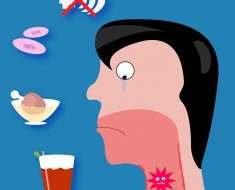Dr Dawn Harper on signs of vitamin B12 and vitamin D deficiency
We use your sign-up to provide content in ways you’ve consented to and to improve our understanding of you. This may include adverts from us and 3rd parties based on our understanding. You can unsubscribe at any time. More info
Vitamin B12 contributes to the body in a number of important ways, such as supporting the nervous system and helping to make DNA. Naturally, B12’s impact is often not felt until you become deficient in it and when this does occur, a change in mood may be present which could later result in a higher risk of dementia or Alzheimer’s disease later in life.
Vitamin B12 plays a major role in producing brain chemicals which are known to affect mood and other brain functions.
Experts warn having low levels of B12 may be linked to depression.
People with B12 deficiency often report changes in mood.
In fact, low levels of B12 have been linked to mood and brain disorders like depression and dementia.

In a study published in the US National Library of Medicine National Institutes of Health, treatment of depression with vitamin B12 was investigated.
Both low folate and low vitamin B12 status have been found in studies of depressive patients, and an association between depression and low levels of the two vitamins is found in studies of the general population, noted the study.
It added: “Low plasma or serum folate has also been found in patients with recurrent mood disorders treated by lithium.
“On the basis of current data, we suggest that oral doses of both folic acid (800 microg daily) and vitamin B12 (one mg daily) should be tried to improve treatment outcome in depression.”
The signs of Alzheimer’s and other forms of dementia can mirror the symptoms of a vitamin B12 deficiency.
Several studies have been conducted to establish the link between vitamin B12 and Alzheimer’s symptoms.
Some associate low B12 levels with both the symptoms of Alzheimer’s and actual shrinkage of the brain.
Other studies have attempted to prove that B12 supplements restored cognitive functioning to previous levels after supplementation.

Another study which was published in the National Library of Health, the link of a B12 deficiency and an increased risk of dementia was further analysed.
“The B-vitamins, particularly folate, vitamin B12, and vitamin B6, are widely believed to be protective against Alzheimer’s disease and age-related cognitive decline,” began the study.
“Current interest in vitamin B12 and folate as risk factors for dementia is based on their relations as co-factors in the metabolism of homocysteine.
“Homocysteine has been related to the risk of developing Alzheimer’s disease in some.”
Among the most common psychiatric symptoms seen in people with B12 deficiency are the following:
- Confusion/disorientation
- Memory loss
- Suicidal ideation
- Psychosis
- Mania
- Anxiety
- Paranoia.
For confidential support call the Samaritans in the UK on 116 123 or visit a local Samaritans branch.
Source: Read Full Article





